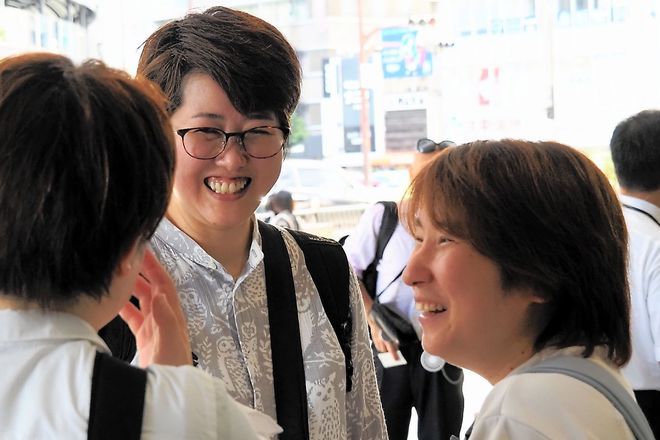Same-sex couples and support groups are calling for systemic fixes to the national census that is touted as “the most important statistical survey” yet does not recognize LGBT couples living together.
The survey is conducted every five years from September through October by the internal affairs ministry to create a portrait of the nation’s households and help to formulate policy measures.
Hitomi Inoue, a 46-year-old veterinarian, and Junko Urimoto, a 45-year-old veterinary nurse, are one couple rendered invisible by the current system.
The pair residing in Osaka’s Suminoe Ward each declared themselves as “head of household” and “never got married” on the 2015 census.
Internal affairs ministry protocol dictates it is fine if one half of an LGBT couple declares themselves as the “head of household.” However, if their partner lists themselves as “spouse of householder,” the ministry will change this status to “other relative.”
Inoue and Urimoto are not simply cohabitating. The women pledged they would go hand in hand as “life partners” before family and friends at their wedding ceremony and reception.
A ministry official said the policy to change the status is partly because gay marriage is not legal in Japan and because whoever fills out the questionnaire could erroneously declare a friend living with them as their spouse.
LONG-OVERLOOKED DEMOGRAPHIC
Regarding her census response from a decade ago, Inoue explained that she one-sidedly assumed that her answer should match the information on her official residential record.
The census survey results, however, are meant to be basic data that the central and local governments draw on to work out various policy measures. If things remain unchanged and their existence erased, LGBT couples would theoretically never see their needs reflected in measures or laws.
“If that’s so, (the central government) should know the facts about same-sex couples,” Inoue eventually decided.
The Shibuya Ward government in Tokyo and Nijiiro Diversity, an Osaka-based nonprofit, indicate that 532 local governments have implemented partnership systems that officially recognize LGBT unions—a figure that covers 92.7 percent of Japan’s population.
As of the end of May, partnership certificates were issued to 9,837 couples.
The advocacy group Marriage for All Japan has called for LGBT couples living together to list themselves as “head of household” and “spouse of householder” on the census. The group’s goal is to see gay marriage legalized, and its activities include providing support for legal action along with submitting requests to the central government.
Inoue and Urimoto followed this advice when filling out their 2020 census and this year’s poll, with Inoue listed as “head of household” and Urimoto named “spouse of householder.”
“The census is the only comprehensive survey that covers all people, whatever their age, nationality, area of residence or other attributes are,” said Saori Kamano, a Waseda University professor who studies social surveys. “It is impactful, partly because it is used to find out biases caused by the sampling process and the attributes of respondents in other surveys.”
Kamano continued: “The census should take the initiative in finding out the facts about same-sex couples.”
An internal affairs ministry expert panel appears open to this idea, saying that “studies and research could be conducted” on the matter for the next and subsequent censuses.
Some countries have already addressed this issue.
The U.N. Economic Commission for Europe in 2015 presented examples of marital status options for LGBT couples in its recommendations for population and housing censuses.
It suggested including choices such as “opposite-sex husband/wife/spouse” and “same-sex husband/wife/spouse” in countries where gay marriage is legal.
Similar options were, in fact, used in the 2020 U.S. census, while Britain’s 2021 census had “husband or wife” and “partner” as possible choices in a question about household relationships.
Another question asked respondents if their legal marriage or registered civil partnership is, or was, to someone of the opposite sex or the same sex.
(This article was written by Asako Hanafusa and Satoko Onuki.)
